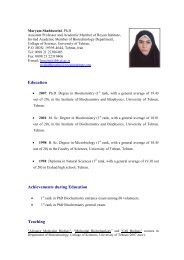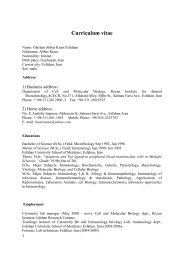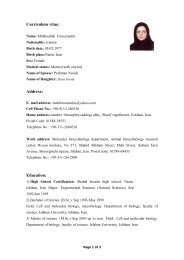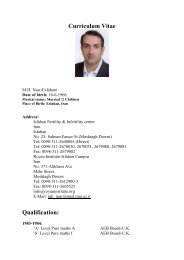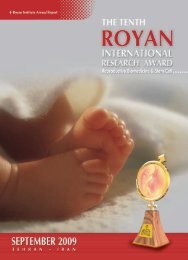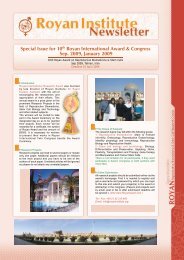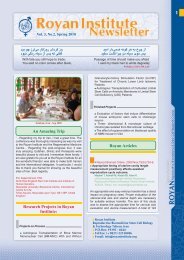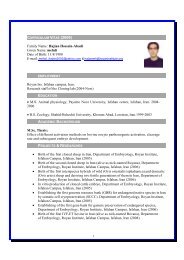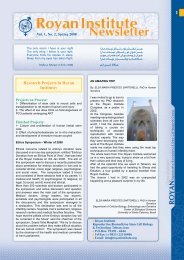Royan International Research Award - Royan Institute
Royan International Research Award - Royan Institute
Royan International Research Award - Royan Institute
- No tags were found...
You also want an ePaper? Increase the reach of your titles
YUMPU automatically turns print PDFs into web optimized ePapers that Google loves.
The Eleventh ROYAN<strong>International</strong> <strong>Research</strong> <strong>Award</strong>WINNERS<strong>International</strong>Winner<strong>International</strong> WinnerNew era in sperm selection for ICSI procedureMohammad Hossein Nasr-Esfahani, PhDIranEmbryologyMohammad Hossein Nasr-Esfahani received his PhD from the University of Cambridge, UK, in 1991 and is currently an academicmember of the <strong>Royan</strong> <strong>Institute</strong> in Tehran, Iran. He has been working as laboratory director of the Isfahan Fertility and Infertility Centresince 1992 and is head of <strong>Royan</strong> <strong>Institute</strong>–Isfahan Campus. The main research areas of the group with which he works are stem cells,cloning and sperm chromatin. He has over 105 publications in international and national journals. The project of the first Iranian clonedsheep and transgenic goat was carried out under his supervision.Objective:Intra-cytoplasmic sperm insemination, the ICSI, is considered as the one most routine treatment of male infertility. Althoughthe genetic inheritance of an individual is based on the genetic contribution from both the oocyte and sperm, consideringthe fact that ICSI by passes all the barriers to natural fertilization much emphasis was given to oocyte quality to improvethe ICSI outcomes. However, recent studies suggest that sperm quality has a profound influence on ICSI outcomes andselection of sperm based on functional characteristics along with morphology and motility may significantly improvefertilization, embryo quality, implantation, and take home baby rates in ICSI. These new sperm selection procedures has ledto “New era in sperm selection procedure” which are different or complementary to routine sperm processing techniquessuch as “swim up or density gradient centrifugation procedure”. In order to establish such techniques comprehensiveunderstanding of sperm functions including: sperm membrane functional characteristics, sperm surface proteins, and spermDNA chromatin integrity and maturity, are essential.Material and Methods:In the first part of the study, we implemented the sperm functional characteristics test, then the relation of these test withsemen parameters, and ICSI outcomes including fertilization, embryonic stage and quality, implantation and pregnancyrates were obtained. In the second part of the study different sperm characteristics upon which sperm can be selectedincluding the sperm surface charge, the Zeta potential and the sperm surface receptor, the hyaluronic acid (HA) receptorwere studied and functional characteristic of sperm selected in these procedures was compared to their control group, inorder to confirm the efficiency of these techniques. In the third part, once the efficiency of each technique was confirmedthey were implemented for ICSI procedure in two different trails.Results:The results, the first part of the study, showed that assessment of protamine deficiency, chromatin integrity by CMA3staining, sperm chromatin dispersion test, tunnel, and comet assay show significant correlation with semen quality and ICSIoutcomes. Thus suggesting these tests are suitable for assessment of sperm functional characteristics. Then, the efficiencyof Zeta and HA sperm selection procedure based on previous studies were evaluated and the results, of the second part ofthe study, showed that both techniques are efficient to select normal sperm in term of sperm morphology, normal protaminecontent and DNA integrity, however, Zeta procedure was more efficient for selecting sperm with DNA integrity whilethe HA method can more efficiently select sperm with normal morphology. Following confirmation of the efficiency ofthese two Novel procedures we implemented these two procedures in ICSI trails along with the appropriate controls. Thethird part of the study, these trials showed that both techniques significantly improve fertilization rate but in our trailsonly the Zeta procedure significantly improved implantation and pregnancy rates. In a single case study we implementedthis procedure for couple with 11 failed IVF/ICSI cycles which resulted in successful pregnancy. Further trails, includingmulticenter trails, are also being carried out to further verify the efficiency of the Zeta procedure on ICSI outcome.Conclusion:The results of these studies, along with complementary studies in the literature suggest that the novel sperm selectionprocedure for ICSI should become gradually mandatory for implementation of ICSI procedure.Keywords:ICSI, Sperm selection, Chromatin, Sperm functional test35



